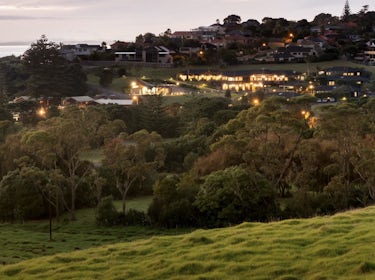NAU MAI HAERE MAI - WELCOME TO VAUGHAN PARK ANGLICAN RETREAT & CONFERENCE CENTREOffering conferencing, accommodation, and retreat facilities in an all-inclusive and welcoming oasis of peace and tranquillity, supported by a team dedicated to providing generous hospitality.
Below is a carousel. To go through the images, please swipe left or right, or tap the next and previous buttons.Skip to contentVaughan Park Anglican Retreat & Conference Centre
Nestled on the rolling hills above Long Bay Beach, our property features the Ruatara Chapel, cedar lodges, ocean-view conference rooms, and lush gardens, creating an unmatched tranquil retreat.
CONFERENCE ROOMS & ACCOMMODATION HOUSES - PĀRA
See AllA BIRD'S-EYE VIEW - ATAATA
ABOUT US - MŌHIOHIO
Read MoreA partnership resource of the Diocese of Auckland and Te Pihopatanga o Te Tai Tokerau, Vaughan Park Anglican Retreat & Conference Centre is a beautiful space nestled in the gently rolling hills above Long Bay Beach on Auckland-Tāmaki Makaurau's North Shore, also known as the City of Sails. We offer you an inclusive and welcoming oasis of peace, grace, and generous hospitality.
OUR HOSPITALITY OFFERINGS
With 4 meeting rooms, the capacity to sleep 40 people at full occupancy, 100 including day visitors, and full on-site catering, our Centre is the perfect location for your next conference, meeting, team strategy day away, social group gathering, or individual stay.

